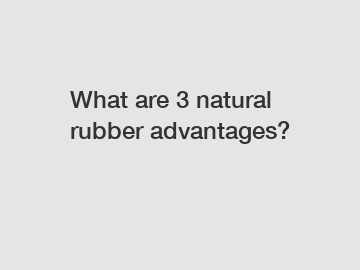What are 3 natural rubber advantages?
Natural rubber is a versatile and widely-used material that offers several advantages over synthetic alternatives. Derived from the sap of rubber trees, natural rubber has unique properties that make it suitable for a wide range of applications. In this article, we will explore three key advantages of natural rubber and highlight why it continues to be a popular choice across various industries.
1. Excellent Elasticity and Flexibility.
One of the primary advantages of natural rubber is its exceptional elasticity and flexibility. Natural rubber can stretch up to seven times its original length without breaking, making it the perfect material for products that require high flexibility. This inherent property of natural rubber makes it ideal for manufacturing items such as gloves, balloons, rubber bands, and elastic bands.

The elasticity of natural rubber also allows it to recover quickly to its original shape after being subjected to stress or strain. This characteristic enables natural rubber to absorb impact and vibrations, making it suitable for use in shock absorbers, tires, and other automotive components. Its ability to withstand repeated stress makes natural rubber a preferred choice for various industrial applications.
2. Excellent Resistance to Abrasion and Tearing.
Another advantage of natural rubber is its exceptional resistance to abrasion and tearing. Natural rubber exhibits high tensile strength, which means that it can withstand significant force without breaking or tearing. This property makes it an excellent choice for products that require durability and longevity.
The resistance to abrasion and tearing makes natural rubber an ideal material for conveyor belts, seals, gaskets, and other industrial applications that face constant friction and wear. It also ensures that natural rubber products can withstand harsh environments and extreme weather conditions, making them suitable for outdoor applications.
3. Renewable and Sustainable Material.
Natural rubber is obtained from the sap of rubber trees, primarily grown in tropical regions. The extraction of natural rubber does not require large amounts of energy or use of harmful chemicals, making it a more sustainable option compared to synthetic rubber, which is derived from petroleum-based sources.
The cultivation of rubber trees also contributes to the sustainable use of land and promotes biodiversity. As rubber trees grow, they absorb carbon dioxide from the atmosphere, helping to reduce greenhouse gas emissions. Additionally, rubber tree plantations can provide a sustainable source of income for farmers in many developing countries.
In recent years, there has been an increased focus on sustainability and environmental responsibility in manufacturing processes. Natural rubber's renewable and sustainable nature has allowed it to gain popularity as a preferred choice for eco-conscious consumers and businesses.
In conclusion, natural rubber offers several advantages over synthetic alternatives. Its exceptional elasticity and flexibility make it suitable for a wide range of applications, while its resistance to abrasion and tearing ensures durability and longevity. Moreover, natural rubber's renewable and sustainable nature aligns with the growing demand for environmentally friendly materials. Whether it's in the automotive, industrial, or consumer goods sector, natural rubber continues to provide outstanding performance and versatility.
For further inquiries about natural rubber and its applications, please feel free to contact us.
For more information, please visit China Cow Rubber Mat, Fkm Rubber Vs Silicone, China Fkm Rubber Sheet.


